Traveling Metta
I’ll be leaving on Saturday for a week-long CDL (Community Dharma Leader) training retreat, which will be held at Garrison Institute on the bluffs overlooking the Hudson River, about an hour north of New York City. I love going to Garrison because the trip involves a gorgeous train ride (on the Hudson River Line), starting at Grand Central Station.
Which will be the perfect place to re-start a practice I used to do whenever I was traveling. I’d look around at people in airports or in cars on the highway or wherever I’d find myself when I was going from one place to another, and I’d say to them (silently) “may you be safe” or “may you be happy” or “peaceful” or “healthy” or whatever.
Sharon Salzberg calls this “Street Lovingkindness.” She made a series of great little videos about it….including one shot in Grand Central Station! It’s very inspiring. Check it out. (click here)
It Feels So Good to Feel Right
 There is a truly wonderful article in the e-newsletter sent out today by the Barre Center for Buddhist Studies (BCBS). The title is a bit off-putting: “Part 2 of a Two-Part Interview on Vedana with Bhikkhu Analayo” but it’s a fabulous read.
There is a truly wonderful article in the e-newsletter sent out today by the Barre Center for Buddhist Studies (BCBS). The title is a bit off-putting: “Part 2 of a Two-Part Interview on Vedana with Bhikkhu Analayo” but it’s a fabulous read.
Here’s a sample:
BCBS: “It’s not so uncommon for meditators to say things like, ‘Oh, that’s a view. That’s an opinion. I shouldn’t have those. I shouldn’t cling.’ Things can shift when we understand that there really is a payoff — we’re getting that pleasant feeling. Then maybe we can also understand, ‘Okay. There’s a reason why I’m doing this. There’s a reason why I’m clinging.’ Then it’s no longer a matter of being crazy or delusional or bad. Once we see what we’re getting out of something, we can decide whether or not it’s really worth what we’re giving up to get it.”
Ven. Analayo: “Yes. That’s exactly the point. And it’s a gradual path. It’s not that suddenly you have no more attachment to views. The point is just to be aware of it. That’s all. Every moment I’m aware of the hedonic part of my clinging is a moment when I’m learning to live with cognitive dissonance — learning to live with not being the way I would like to be. And this is precisely what I want. I want to be able to be with myself when I’m not the way I want to be. Because this is the reality of the present moment. And from there, step by step, the gradual improvement happens.”
BCBS: “So beautiful, Bhante. It’s easy to miss that part and think, ‘I’m not allowed to have strong views anymore. I shouldn’t form strong opinions.’ But looked at in this way, you can have strong views and opinions. It’s just a matter of not clinging to them.
Ven. Atalayo: “The Buddha had very strong views. When a monk would misrepresent his teaching, he’d call him and say, ‘You are a fool. What did you say? Did I ever teach that?’ Scolding him in front of everyone. And the monk sits there, shoulders drooping, head down, sad, unable to talk. The Buddha really lets him know it, but there’s no aversion there, no clinging. Now, we’re not in the position of the Buddha, and we don’t have to be so strong. But it’s not a matter of becoming blurry and not knowing what is right and wrong — that is not the point. The point is simply allowing the basic capacity of mindfulness to see the whole situation……
“And this is all based on feeling. It’s all based on this awareness of the hedonic side. Maybe we don’t catch it at the moment it happens in discussion, but we can see it afterwards. ‘Yes. At that point I got really excited. And I had all those strong feeling, and then I went really overboard with the way I was discussing it.’ Just acknowledge it. Not saying, ‘Oh, I shouldn’t have done it.’ No. Just being aware that this is how it happened. And the next time closer to it, closer to it, and eventually we’ll notice it right at the time it happens. And maybe at that time we can just let it go.”
***
To read the full interview, click here.
“I Was Like…Whoahhh!”
 In case you missed it, there’s a great interview in the March issue of Lion’s Roar magazine, titled: How Sharon Salzberg Found Real Happiness.
In case you missed it, there’s a great interview in the March issue of Lion’s Roar magazine, titled: How Sharon Salzberg Found Real Happiness.
(That’s Sharon, on the right, when she was in India in the early ’70s.)
I particularly like the part of the interview where Sharon tells about the first time she tried meditation, on a retreat in India:
The ten-day retreat was led by S.N. Goenka, a former Indian businessman and famed teacher of vipassana (insight) meditation. He told the participants that the point of the practice was to see, and free themselves from, old patterns. Salzberg was surprised at the emotions that began to surface.
“Did I know I felt afraid? Or angry? Probably not, until I went to India, and then I was like whoahhh!” she remembers. “Even though it was hard, from the moment I started, I thought, ‘There’s truth here. This is it.’ There was a deep sense of rightness.”
Salzberg found a sense of community among her fellow seekers. That famed Goenka course included many Westerners who would become leading figures in the growth of Eastern spirituality in the West, including Ram Dass, Joseph Goldstein, Jack Kornfield, Mirabai Bush, Krishna Das, Dan Goleman, and, of course, Salzberg herself.
[Note: This is the same Mirabai Bush who introduced me to meditation in 1998 and who has become my teacher/mentor/beloved friend.]
Salzberg says, “Many of my close friends are still people I met at my first retreat in January of 1971,” she says. “When I say all beings want to be happy, what I actually think I mean is we all want some sense of belonging.”
Putting her faith in a tradition and a body of knowledge gave Salzberg a sense of confidence. “I took refuge in the Buddha very happily,” she says. “There was an authenticity or integrity to what you were learning. There was a sense that you’re not alone—there’s wisdom here, people have done this, they have walked this path.”
On the final day of the retreat, Goenka introduced the practice of metta, or loving-kindness. “I had never been so at home, never been so happy,” Salzberg says. “This is what I had longed for, not surprisingly—a sense of unconditional love.”
***
The interview includes a lot more stories about Sharon’s early life and the circumstances that brought her to that first retreat. Click here to read more.
In One’s Own Mind
 A little more today from the Tricycle interview with Joseph Goldstein:
A little more today from the Tricycle interview with Joseph Goldstein:
“One of the qualities that has sustained my practice over these many years is a tremendous interest in, even fascination with, the nature of mind. What is this experience we call mind? What is mind as a phenomenon? What actually IS awareness or consciousness?
“This is such a powerful arena of investigation. And what thoughts and emotions influence and color this mind? We can see that our whole life, our whole word, in one way or another is a manifestation of mind.
“From one perspective, we could say that what’s going on in the world is a galactic battle of mental factors. There’s greed and desire and fear and love and compassion and mindfulness, and they’re all playing themselves out in this vast sphere of empty awareness.
“For me, its completely fascinating to see in this mind both the potential for huge suffering and the potential for enlightenment, awakening, and all kinds of happiness. And to see that this is one’s own life. It’s one’s own mind!”
“Retreat” vs. “Real Life”
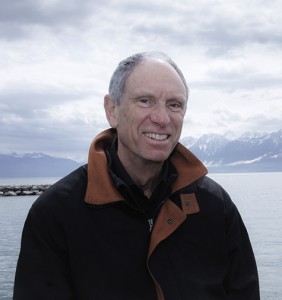 At next Sunday Sangha, I’m thinking of reading from an excellent interview with Joseph Goldstein that just came out in the Spring issue of Tricycle magazine.
At next Sunday Sangha, I’m thinking of reading from an excellent interview with Joseph Goldstein that just came out in the Spring issue of Tricycle magazine.
Here’s a sample:
Interviewer: “I often hear people draw a distinction between ‘retreat’ and ‘real life’. As someone who has devoted a good deal of his life in retreat, or creating a place for people to enter into long-term retreat, how would you respond to this distinction?”
Joseph: “Slightly tongue-in-cheek I would say that really, retreat is real life and non-retreat isn’t. It’s more likely on retreat that we’re living in awareness of what’s happening–more so than when we’re busy in the world.
“So in that sense we are connected with the reality of what’s going on more on retreat, and in our busy lives in the world we’re more often caught up in the stories and in the movies of our mind, which in a certain sense in not the real world; its just the world of our mental projections. That’s the more superficial response.
“The fuller response, I think, is that in a very basic way it’s a false distinction. The mind-body process is working all the time, whatever we’re doing. It doesn’t stop when we’re on retreat and start again when we’re out in the world, or reverse. It’s the same process going on all the time.
“The real question, whether we’re on retreat or out in the world, is: Are we aware of this mind-body process or not? Are we being mindful of what’s happening or not?”
***
There’s a lot more. Click here to read the full interview.
A Bunch of Crazy Kids
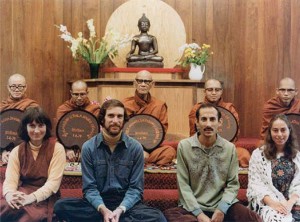 Forty years ago a group of kids in their 20’s — Sharon Salzberg, Joseph Goldstein, Jack Kornfield and a few others — having studied/practiced Buddhist meditation in Thailand and India — had the crazy idea of opening a meditation retreat center in the US.
Forty years ago a group of kids in their 20’s — Sharon Salzberg, Joseph Goldstein, Jack Kornfield and a few others — having studied/practiced Buddhist meditation in Thailand and India — had the crazy idea of opening a meditation retreat center in the US.
The Insight Meditation Society (IMS) website tells the story like this: “On hearing of a Catholic novitiate for sale in Barre, Massachusetts, they came to take a look. As they traveled through the picturesque New England town, its motto, displayed on the town common, came into view: Tranquil and Alert. This seemed a fitting sign and captured the spirit of meditation. Generous friends and supporters provided enough funds to purchase the property, priced at $150,000. And on February 14, 1976, a small band of teachers and staff opened the center.”
As Sharon likes to say, “For the first 20 years or so, IMS was run without any adult supervision.” Joseph adds, “There were many ups and downs, but somehow, with the help of many people, 40 years later we’re really in a good place.”
Click here for a great little video celebrating IMS’ 40th Birthday. Click here for more information and to see photos of these “kids” and the center they built, over the past four decades.
Happy Birthday, IMS!
You Just Can’t Miss It
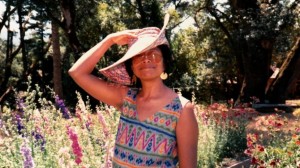 Yesterday we held our first-ever Retreat in a Box (led by Jack Kornfield) and I think it was a hit. (Jack’s always a hit.)
Yesterday we held our first-ever Retreat in a Box (led by Jack Kornfield) and I think it was a hit. (Jack’s always a hit.)
So for today I offer this by Alice Walker, which Jack quoted at the retreat:
“One day when I was sitting there like a motherless child which I was, it came to me, that feeling of being a part of everything, and I knew if I cut a tree, my arm would bleed, and I laughed and cried and I ran all around the house. When it happens, you just can’t miss it.”
What We’re Looking For
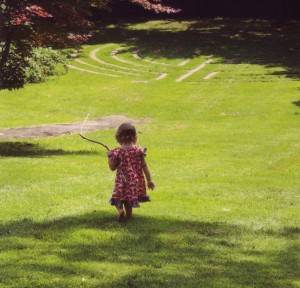 For today, another quote from The Sacred: Wisdom from Contemplative Teachers, curated by Mirabai Bush:
For today, another quote from The Sacred: Wisdom from Contemplative Teachers, curated by Mirabai Bush:
“I think people everywhere, young and old and in between, are searching for signs of the sacred in their life, all the time, whether they know it or not. Although there are some tools of practice being used for results simply like stress reduction, I think that’s not ultimately what people are looking for.
“They’re looking for liberation. They’re looking for the sacred. They’re looking to feel that sense of belonging. They want to love and they want to feel unconditional love. And they have wanted that from time immemorial. It is that sacredness that doesn’t need a religious institution. The greatest power of the contemplative arts and meditation is the renewal of the sacred.”
— Steven Smith, founder of Hawai’i Insight Meditation Center
The Temple Within
 I’m back from the CDL training retreat and my stay with Mirabai, but I’m not quite ready to post about either of them — perhaps because they were both quite amazing.
I’m back from the CDL training retreat and my stay with Mirabai, but I’m not quite ready to post about either of them — perhaps because they were both quite amazing.
So for today, I leave you with this quote from Jon Kabat Zinn (from a sweet little booklet Mirabai curated, The Sacred: Wisdom from Contemplative Teachers).
“Contemplation has the word temple in it. And it really includes the notion that the human being is in touch with being a numinous being, a luminous being, and engaged in something that’s nothing less than sacred — being committed in some way to a sacred calling.”
Introducing: Retreat in a Box
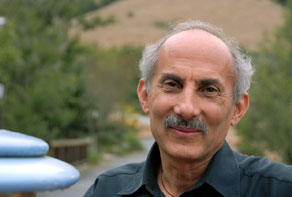 On Sunday, October 11, Dharma Town will host a day-long video-recorded retreat led by Jack Kornfield. Jack led this Introduction to Mindfulness Meditation retreat at Spirit Rock in April of 2014, where it was also offered as a live webcast. The recording of the webcast was made available to Spirit Rock monthly donors (of which I am one).
On Sunday, October 11, Dharma Town will host a day-long video-recorded retreat led by Jack Kornfield. Jack led this Introduction to Mindfulness Meditation retreat at Spirit Rock in April of 2014, where it was also offered as a live webcast. The recording of the webcast was made available to Spirit Rock monthly donors (of which I am one).
I checked with Spirit Rock and they said it would be OK for me to invite a group of people to “attend” the recorded retreat, which includes dharma talks, instruction, guided and silent sitting meditation, walking meditation with instructions, and a Q&A session — all given by Jack Kornfield.
So….Spirit Rock RETREAT-IN-A-BOX was born!
This event is FREE and will be held at the home of one of our sangha members. Space is limited, so reservations are required. If you are interested and would like more information, please email Jan here.
If all goes well, we plan to offer a retreat like this every quarter. The next one is schedule for Sunday, January, 17, 2016. Future topics and teachers are:
No Self in the Brain, led by Rick Hanson
Buddhist Psychology, oled by Jack Kornfield
Equanimity, led by Sharon Salzberg
Stay tuned!

